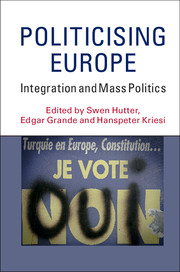Book contents
- Frontmatter
- Contents
- List of figures
- List of tables
- List of contributors
- Preface and acknowledgements
- Part I Theory and methods
- Part II Mapping the politicisation of European integration
- 3 The politicisation of Europe in public debates on major integration steps
- 4 Is the giant still asleep? The politicisation of Europe in the national electoral arena
- 5 Protesting European integration: politicisation from below?
- Part III Driving forces and consequences of politicisation
- Part IV Conclusions
- Methodological Appendix: measuring politicisation, benchmarks and data
- Bibliography
- Index
3 - The politicisation of Europe in public debates on major integration steps
from Part II - Mapping the politicisation of European integration
Published online by Cambridge University Press: 05 March 2016
- Frontmatter
- Contents
- List of figures
- List of tables
- List of contributors
- Preface and acknowledgements
- Part I Theory and methods
- Part II Mapping the politicisation of European integration
- 3 The politicisation of Europe in public debates on major integration steps
- 4 Is the giant still asleep? The politicisation of Europe in the national electoral arena
- 5 Protesting European integration: politicisation from below?
- Part III Driving forces and consequences of politicisation
- Part IV Conclusions
- Methodological Appendix: measuring politicisation, benchmarks and data
- Bibliography
- Index
Summary
Introduction
Public debates on key events in the integration process have been the most important object of analysis in the study of politicisation in Europe (see Trenz 2005; Koopmans 2007; Adam and Pfetsch 2009; Koopmans and Statham 2010a; Risse 2010; Helbling et al. 2012 and Hoeglinger 2012). In many respects, they seem to be perfect sites for a politicisation of the European integration process. They are triggered by critical institutional events in the integration process, and unlike national elections they directly focus attention on specific aspects of European integration – either transfers of authority and changes in the institutional framework of the EU or the admission of new member states. Moreover, they are open for the participation of all kinds of actors beyond the narrow scope of the national governmental elites and political parties. To paraphrase Schattschneider (1975 [1960]: 1), public debates are the contests where it is easiest for the ‘crowd’ to get in, where the ‘fight’ is most directly pointed at European integration issues, and where it is not contained by national boundaries. Therefore, the cosmopolitan potential of politicisation should become most apparent in these debates, and we should expect particularly high levels of politicisation in debates on the most important integration steps, such as the Maastricht Treaty and the Constitutional Treaty.
For all these reasons, public debates on major integration steps seem to be the perfect ‘window of observation’ for analysing the politicisation of European integration, and we start our empirical stocktaking of politicisation here. In particular, they give us the opportunity to investigate the expansion of the range of actors in two directions: politically, we examine the participation of non-government actors from political parties and organised civil society; and territorially, with regard to the scope of horizontal and vertical Europeanisation, we are interested in the importance of foreign national and supranational actors in the public debate. As highlighted in the previous chapter, our data allow debates to be analysed at two different levels. At an aggregate level, we can examine controversies on an integration step as an ‘integrated European debate’. This includes statements reported in any of the six newspapers made by all types of actors from all territorial levels. This is most appropriate for a general assessment of politicisation and its variation across integration steps.
- Type
- Chapter
- Information
- Politicising EuropeIntegration and Mass Politics, pp. 63 - 89Publisher: Cambridge University PressPrint publication year: 2016
- 10
- Cited by

